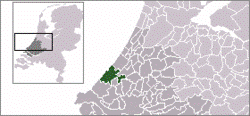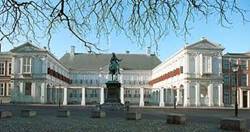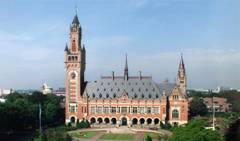 About the Hague About the Hague
General information
The Hague (officially ‘s-Gravenhage) is the capital city of the province of South Holland in the Netherlands. With a population of 500,000 inhabitants and more than one million inhabitants including the suburbs, it is the third largest city of the Netherlands, after Amsterdam and Rotterdam. Located in the west of the Netherlands, The Hague is in the centre of the Haaglanden conurbation and lies at the southwest corner of the larger Randstad conurbation.

 The Hague is the seat of the Dutch government and parliament, the Supreme Court and the Council of State, but the city is not the capital of the Netherlands which constitutionally is Amsterdam. Queen Beatrix of the Netherlands lives at Huis ten Bosch and works at Noordeinde Palace in The Hague. Most foreign embassies in the Netherlands and 150 international organizations are located in the city, including the International Court of Justice and the International Criminal Court, which makes The Hague one of the major cities hosting the United Nations, along with New York, Vienna and Geneva. The Hague is the seat of the Dutch government and parliament, the Supreme Court and the Council of State, but the city is not the capital of the Netherlands which constitutionally is Amsterdam. Queen Beatrix of the Netherlands lives at Huis ten Bosch and works at Noordeinde Palace in The Hague. Most foreign embassies in the Netherlands and 150 international organizations are located in the city, including the International Court of Justice and the International Criminal Court, which makes The Hague one of the major cities hosting the United Nations, along with New York, Vienna and Geneva.
Venue
The World Forum is an international congress centre in The Hague, the city of peace and justice. Each and every one of the extraordinary meetings and events that
take place in the World Forum, no matter what the scale, have the potential to change the
world view of those who attend them. Whether it’s an international conference on banning chemical weapons, or an illuminating discussion between two CEOs, these are events that shape the world.
The conferences of the International Criminal Court (ICC) or the OPCW (Organisation for the Prohibition of Chemical Weapons) held here represent dialogues at the highest levels of international relations and law. And in 2009, the World Forum successfully hosted the biggest peace conference to be held in the Netherlands since the Second World War: the UN summit on Afghanistan, with its 73 delegations from all over the world.
Along with national and international conferences at the highest level, the World Forum also hosts corporate events, association congresses and receptions and exhibitions. The flexibility of its multifunctional location allows the World Forum to offer a wide variety of events for any target group. The site is also home to the Netherlands’ largest theatre auditorium, where many major national and international productions are staged.
World Forum Convention Center
Churchillplein 10
2517 JW The Hague
The Netherlands
www.worldforum.nl
Public transport
The website of Amsterdam Schiphol Airport provides detailed information on how to travel to and from Schiphol Airport.
 Public transport planner Public transport planner
Plan your own trip by public transport with this tool.
The Hague: getting there and around
The Hague is located in the centre of Europe, between London, Frankfurt, Berlin, Paris and Rotterdam - the world's largest port. It is only 30 minutes for Schiphol International Airport (by car or by train).
The Hague is at the heart of the Randstad, the urban conglomeration in the west of the Netherlands outlined by Amsterdam, Utrecht, The Hague and Rotterdam. Not just the highest population centre, the Randstad is also the centre of business, and where the majority of international companies are located.
The Hague boasts an excellent public transport system. Over 30 bus and tramlines will take you quickly and safely to your destination in and around The Hague.
Some History
Though officially called Den Haag, it is often referred to as s-Gravenhage, literally: 'The Counts' Hedge'. The Counts of Holland enjoyed hunting and took special interest in the area’s vast forests which are now known as the Haagse Bos. In the 13th century Count Willem II built the Binnenhof, or current Houses of Parliament. The Hague was first chartered as a village called Die Haghe until Louis Napoleon, King of the Netherlands from 1806, took entry. By 1851, local legislation no longer distinguished cities from villages and they all became municipalities or gemeenten, with The Hague as the Royal Residence and Amsterdam as the capital.
The 20th century saw The Hague coming of age as an international city of peace and justice. In 1899, delegates from 26 countries gathered at Huis ten Bosch for the First Peace Conference and an even larger Second Peace Conference in The Hague followed in 1907. Today The International Court of Justice, commonly referred to as the World Court or ICJ, the primary judicial organ of the United Nations, is based in the Peace Palace in The Hague.
Things to do, things to see
The Hague offers a wide range of activities inherent to a modern city. The Hague has its share of museums and cultural institutions, such as the Mauritshuis, the Escher Museum, the Municipal Museum, Prison Gate Museum, Panorama Mesdag and the Louwman Museum. The city also houses the recently renovated miniature city of Madurodam.
The Lange Voorhout is a wide avenue containing many splendid houses (now home to several embassies) as well as The Hague’s oldest and narrowest house and the famous ‘Hotel des Indes’ the city’s most luxurious hotel. The Passage was the Netherlands’ first covered shopping mall. Dating from the late 19th centry, it contains many expensive and speciality shops.
The Hague is conveniently located near the North Sea Coast, which makes a visit to Scheveningen easy to undertake.
Surrounding cities such as Delft and Leiden can be reached by public transport. The Hague shares an airport with Rotterdam.
For more touristic information about The Hague, the activities and upcoming events, please visit the following link: http://en.denhaag.nl/en.htm (alternate languages can be selected in the upper right corner) |





